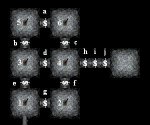Tuzenbach
First Post
ScotMart2000 said:Label the chest A, B and C. We'll say the gold is in chest A. Here are the 3 possibilities if the characters switch their choice:
1. The adventurers pick chest A. The host reveals B is empty. The adventurers opt to switch their choice to C. They lose.
2. The adventurers pick chest B. The host reveals C is empty. The adventurers opt to switch their choice to A. They win.
3. The adventurers pick chest C. The host reveals B is empty. The adventurers opt to switch their choice to A. They win.
By switching, the adventurers win 2 out of 3 times. By keeping their original choice, they only win 1 out of 3 times.
This happens because the host always reveals an empty chest that the characters have not picked. So, if the characters pick an empty chest (2 out of 3 times they will), the host will have to remove the only other empty chest and leave the chest of treasure there for the characters to switch to.
I realize this is fairly anti-intuitive at first, but I think once the possibilities are laid out, you see why it works.
-Scot
Ah, yes, BUT............
What if the "prize" in the applicable chest is worth only 90gp? Then paying 100gp in order to change the chest of choice merely results in the characters losing 10gp in the deal. Sorry I brought it up!

